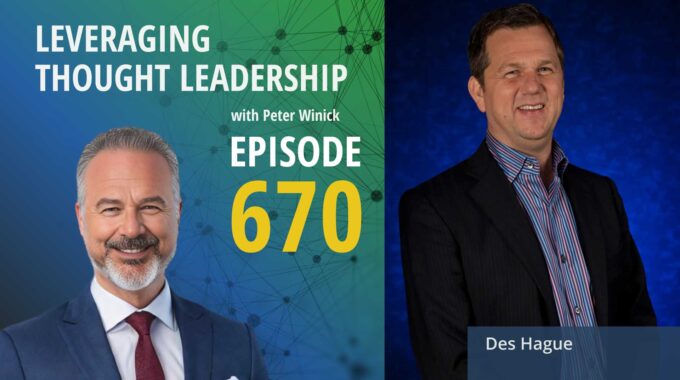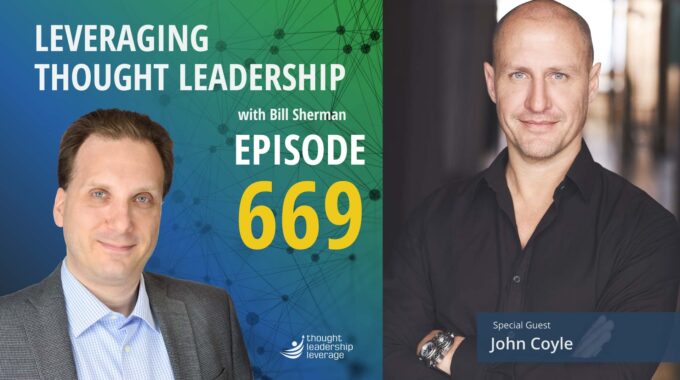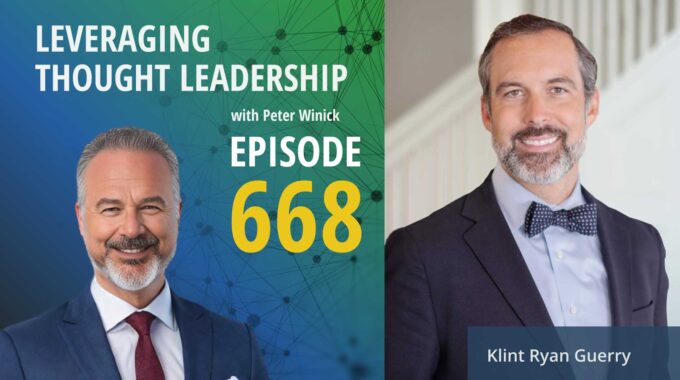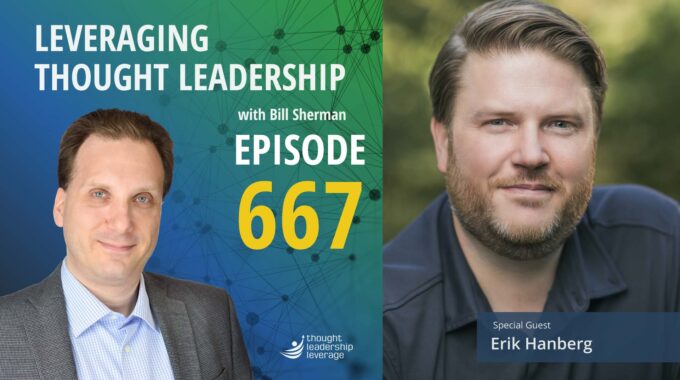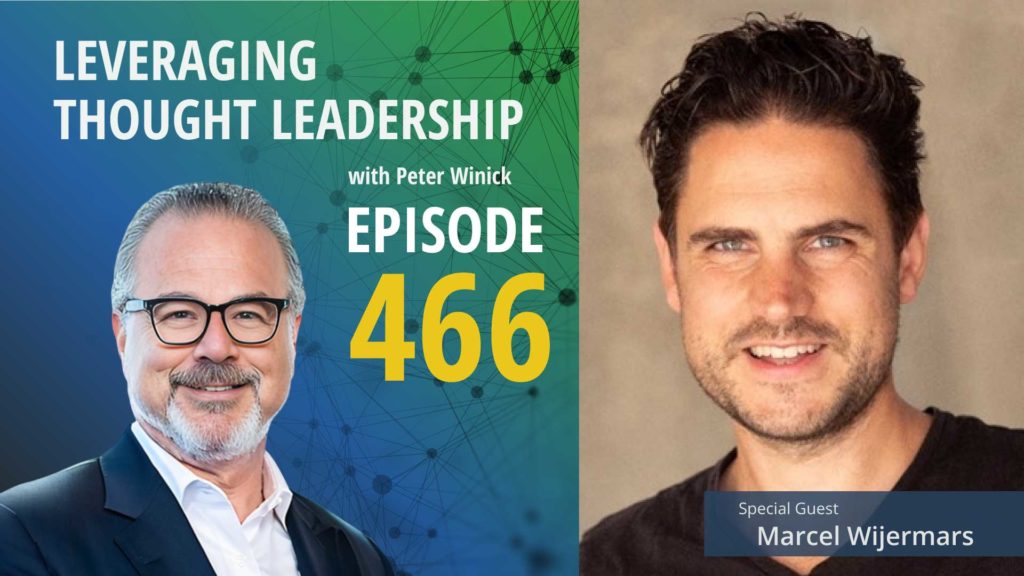



Learning to lead and network as an introvert.
An interview with Marcel Wijermars about helping introverted leaders overcome the energy drain and find success at networking events.
How do you take a personality trait that many might consider a setback, and turn it into a multi-faceted business?
My guest today is Marcel Wijermars, the founder of Introverted Leadership and keynote speaker for the well-known speech, “The Introvert Way to Create a Life of Abundance.”
Years ago, Marcel realized his introverted nature was having a negative impact on his professional life. He had difficulties meeting people and networking, and those challenges were holding him back in business. Through self-experimentation, Marcel created models and frameworks to help himself overcome these challenges, and now shares those insights, helping thousands of others understand and appreciate their introverted nature.
Being an introvert doesn’t mean you are shy or have poor social skills. Introversion means that you don’t get energy from social interaction. Marcel shares why fellow introverts need to be more strategic around which connections give them inspiration and are most beneficial to their business. Marcel gives some valuable tips for introverts traveling and attending events to help manage the energy drain.
If you self-identify as an introvert or have associates who do this episode can help you better understand the difficulties and how to overcome them.
Three Key Takeaways:
- Finding your audience can be as easy as looking for the symptoms of the problem you are looking to solve.
- Don’t let what others consider a negative trait hold you back. It could in fact be the key to an entire business model.
- Introverts need to focus their time on the connections that are most impactful to their business.
If you need a strategy to bring your thought leadership to market, Thought Leadership Leverage can assist you! Contact us for more information. In addition, we can help you implement marketing, research, and sales. Let us help you so you can devote yourself to what you do best.

Transcript
Peter Winick And welcome, welcome, welcome. This is Peter Winick. I’m the founder and CEO at Thought Leadership Leverage and you are joining us on the podcast today, which is Leveraging Thought Leadership. Today. My guest is Marcel Wijermars. He is an introverted leadership expert, so he’s an introvert himself. He’s got a really interesting model and framework and a business focused on this. He’s got a signature keynote called The Introvert Way to Create a Life of Abundance, and he’s got a group membership program as well. So welcome. How are you. Marcel?
Marcel Wijermars Thank you. So nice to be here. And I’m more than impressed by your pronunciation of my last name.
Peter Winick Yeah, well, we practiced a little bit, but I like to try to do my best to get that get that right because it’s been so busy. So I want to start with sort of the origin story, Right. Because your expertise and your over your entire career wasn’t on introversion. An introvert is something that is a component of your personality, who you are, etc.. How did what’s the origin story of taking, in essence, a personality trait and morphing it into a multifaceted business? What? How did that happen?
Marcel Wijermars Yeah, so I just love being able to share a challenge. I’ve been through myself that basically transformed my personal life as well as my business. So if we look back a couple of years ago. I wasn’t very good at making new connections and networking.
Peter Winick Okay. Now, for some people that’s true. And that’s okay. And, you know, it has no impact on their professional life or their career. But you realize that it was having a negative impact.
Marcel Wijermars Absolutely. Yeah. So first of all, I was building a business and I had to build a network in the United States of both suppliers and customers. So that inquired a lot of networking and also on a personal level. So I started being location independent. Some people call it being a digital nomad, which means everywhere you go you start with zero connections and you need to start from scratch.
Peter Winick Well, but let me push on that. So part of the sort of lifestyle of the digital nomad is I can do what I need to do from wherever I am, right? I can be in this country, that country, whatever. And most of my work and connections are remote, so it doesn’t matter. But you’re introducing another component to that, whereas every time you move place, you’re starting at sort of ground zero from a physical connection perspective.
Marcel Wijermars Absolutely. Yeah. So for me, it’s like I never got energy or fun from digital meetings like Zoom meetings or phone calls or text messages. I always want to have some like-minded friends where I am, to go have a drink together.
Peter Winick Yeah, right. So when you’re moving from community to community, you don’t just want to walk into the local bar and introduce yourself to 20 people, right? That’s difficult.
Marcel Wijermars Yeah. Like, especially it was very difficult for me. I think I would be able to do it now. Doesn’t mean that’s necessarily the way I would go about it, because I focus more on getting connections that are relevant for me as well. Like we have similar interests and the like. Going into a random bar is a bit of yeah, it’s a guess that could work out.
Peter Winick So you talk a lot about in your work. So I love that the origin story – and these are usually the best ones in my opinion – are, wasn’t like, Hey, I decided to launch this business. It was really trying to solve a problem that you struggled with, which was, I’m an introvert. I’m also an entrepreneur. In order to be a successful entrepreneur, you came to the realization that you needed to develop more relationships, and being an introvert was preventing you from do that at a level that you wanted to. So tell me a little bit about how you developed and then articulated sort of the model and the method and the framework, because I think part of the piece here is most people think extroversion or charisma is just some luck of birth, right? Some people just have it. And then therefore, if you’re an introvert, it’s a deficiency, which is just not so. So given that it’s probably an equal split out there, tell me a little bit about the model to help introverts become leaders and connect and do the things that you’re advocating that they do.
Marcel Wijermars Yes, absolutely. So what’s very important is that introvert doesn’t mean shy or that you don’t have social skills. Introvert means that you gain energy from turning inwards, whereas extrovert means that you gain energy from turning outwards and having a lot of interactions. So, well, you could say because introverted people, they don’t gain energy from social interactions, they might do it less and get less exercise in having social interactions and therefore be shy because they don’t have confidence.
Peter Winick Not only do they not gain energy, they might actually lose the energy they have. Not even. Yeah, yeah, yeah.
Marcel Wijermars Very important points. Yeah. So yeah. To like to answer your question, I started off as a I guess shy introverts with not a lot of social skills and not knowing how to make new connections. And what I did is I got more strategic. So I learned how to make new connections. I got over my shyness. And just because of learning that I’m an introvert and I’ve limited energy to to have social interactions, I became more strategic about which connections gave me much most inspiration and like were most beneficial for my business.
Peter Winick Got it. So you mentioned energy. So I have a lot of friends and colleagues and clients that are introverts and they talk about the energy that like if they have to do something like go to a social event, cocktail party, whatever, that to an extrovert gives them energy they like. They need time to recuperate from that because it’s like they might do it for an hour or to prepare themselves to do it. And then there’s almost like a crash, right? Like a sugar crash or something where you need to recharge. But I think, you know, what’s interesting about that is once you understand that, then you can figure out how to work through that or work around that or manage it.
Marcel Wijermars Yeah, absolutely. So for business trips, I always make sure I travel there alone. I have my own place to stay. Yeah, I’m not much. The day I go there, I travel to the venue well in advance so I can grab a coffee close to the spot. And I’m not rushed when I go in.
Peter Winick Yeah.
Marcel Wijermars I plan some meetings, but I also plan some free time during the day and multiple times during the day. I leave the venue. I just go get a coffee or get lunch alone. I like to just get quotes straight to recharge and yeah, that way I can kind of make it work without it.
Peter Winick So I want to move now. So. So the you know, you’ve experimented on yourself, you’ve refined and the model and the methodology. Let’s talk about the business side of this. Right? So I don’t think but I asked that when you got into this, the point was to turn it into a business, right? It was just an experiment.
Marcel Wijermars Hmm. Yeah. When I initially committed to giving a talk about the subjects, it was mostly to share my experience in order to help others. I noticed such an interests, both from introverts who are either overwhelmed or have a difficult time making new connections, as well as from extroverts who would love to understand more about introverts and how to cooperate. That I thought like, okay, this could actually be a very interesting business opportunity as well.
Peter Winick If you’re enjoying this episode of Thought Leadership Leverage, please make sure to subscribe. If you’d like to help spread the word about our podcast, please leave a five-star review at ratethispodcast.com/ltl and share it with your friends. We’re available on Apple Podcasts and on all major listening apps as well as at ThoughtLeadershipLeverage.com forward slash podcast.
Peter Winick So let’s talk about – because I think regardless of the thread of thought leadership, introversion, resilience, leadership, whatever. You had a a thought that maybe there’s a business here, Right. So what are the things that you did early on to validate that assumption? What are the things that worked, what didn’t work? And then what does the business look like today as a result of those activities?
Marcel Wijermars Right. Yeah. So actually, I founded another business before that, which is a business that helps candidates in the United States to find jobs. And I’m still transitioning out of that. So it’s still very early days for my introverted leadership business. We’re currently in the last weeks of doing the transition. So, yeah, for my new introverted leadership business, it’s still early days and yeah, I’m still building out the business.
Peter Winick So. Okay, so, so if it’s early days, help us look behind the curtain, if you will. What do you think it really two. Two thoughts here. Who’s the target market and what are the offerings that you’re putting out there? And by offerings, I mean what will people pay for? What do you think they will pay for?
Marcel Wijermars Yeah. So specifically our targets, the introverted leaders.
Peter Winick Okay.
Marcel Wijermars So become better at networking.
Peter Winick So when we talk about introverted leaders, it’s really easy from a marketing standpoint to find any target that aligns with what I would call a hard characteristic age, education, income level, etc.. Introversion is a soft characteristic, right? You can’t go on LinkedIn and say, get me leaders that are, you know, whatever of this size company have been in the business for this long. Oh, and they’re introverted, right? Oh, they’re really intelligent. So what are the how do you find the introverts? That’s the work. Leaders are easy to find.
Marcel Wijermars Absolutely. Yeah. So it’s you find it by the symptoms, basically. So most of the times introverted leaders are either overwhelmed like they get so many like requests for their time, like phone calls, emails, meetings, dinner events, etc., etc. And it completely brings them like that’s one end of the spectrum. And the other end of the spectrum is entrepreneurs, leaders who have very good hard skills. Maybe they have a fantastic product, but they don’t know how to make the connections to get to the next level.
Peter Winick So you mentioned you find them by speaking to the symptoms. So we to me, those are the pain points, right? So instead of it being a demographic check, a box, you know, leader at a company of a thousand people, you have to make some hypotheses and put some thought leadership out there that speak to the pain points and the struggles and the issues they have so that they can lean in and self-select. Right. Is that.
Marcel Wijermars Yes.
Peter Winick So what are the some of the things that you’re going to be doing along those lines? Because that’s I think I think that’s true. And I think that’s where a lot of people have a hard time saying, geez, you know, I know this is a problem. I know a lot of people struggle with it, but how do I find my peeps online, Right? How do I connect to them?
Marcel Wijermars Yeah. So that’s actually very interesting. I a couple of weeks ago, I gave my talk the introvert way to create a life of abundance in Cape Town, South Africa. And a lot of I gave a lot of examples. Like, let’s say you’re at a networking event, you sometimes have this feeling after like 2 hours of talking to people that you just hit a wall.
Peter Winick Can’t you’re done, right? You’re exhausted, but.
Marcel Wijermars You want nothing more than to go home. Even though you had a great time. You really enjoy yourself, but you hit a wall. So in there I saw. Like it was approximately 50/50. So 50% of people totally recognized this. And the other half, they had no idea what this was. So by giving chance.
Peter Winick You’re experimenting with different hypotheses and say, Wow, 50% of that audience does hit the wall, then I can start putting some content on out on how to over how to manage hitting the wall as an introvert or something like that, as an example.
Marcel Wijermars Yeah. This was specifically about also the self-selection question, like this is a way to do it by giving examples of this is what it could feel like if you’re an introvert and you. Yeah. So and then a lot of people came up to me actually in the days after to talk. That resonated with a lot of the examples.
Peter Winick Right. So I think I think that self-selection piece is interesting because. People might think about introversion and extroversion as good or bad, or maybe they haven’t thought about it, so they don’t identify one way or another, whatever or whatever. So sometimes as a thought leader, you have to show them other ways to think about it. Right. So that’s really interesting. Okay. So you’ve got your talks. What are the other lines of business that you plan on launching under this umbrella?
Marcel Wijermars Right. So I’m currently developing an online program specifically for introverted leaders who want to get more out of in-person networking events.
Peter Winick Interesting. That’s a very specific use case. So I identify as an introverted leader based on whatever the criteria is, and I can relate to the experience of I go to networking events and either they’re horrible, I’m not getting the value out of them. My extroverted friends come out with all sorts of new relationships and opportunities. So that’s a problem that I’d like to solve. So I like how you made that really focused and specific.
Marcel Wijermars Yeah. And for some people it’s worse. Like they get nervous and they feel sick weeks before the networking events even starts.
Peter Winick Right. Right. Cool. Cool. And then in the last couple of minutes that we have, you know, you mentioned your keynote keynotes are great, but they’re not valuable unless you’re keynoting in front of someone. So what are the things that you’re doing to get in front of the right audiences, whether that’s physically in person or more often these days online? How are you? How are you getting in front of audiences with that message today?
Marcel Wijermars Yeah, so it’s basically my goal to do this in-person. I would enjoy that more than I noticed that because this is a very interactive talk with responses from audiences. And yeah, just need to see what people engage with react to. So I fully focus on in-person events. I recently did the talk for the first time in Cape Town. I’m now working on organizing something in Amsterdam in December, and then for next year I’m still working on the schedule. I’ll probably do like one month of different events in Europe and in the United States. But that’s also still early days. I still have to plan everything.
Peter Winick Right? Right. Well, it’s been fantastic. I appreciate you coming on and sharing your journey with us, Marcel. Great stuff. Thank you.
Marcel Wijermars Really enjoyed it. Thank you so much.
Peter Winick My pleasure. To learn more about Thought Leadership Leverage, please visit our website at Thought Leadership Leverage dot com to reach me directly. Feel free to email me at Peter at ThoughtLeadershipLeverage.com and please subscribe to Leveraging Thought Leadership on iTunes or your favorite podcast app to get your weekly episode automatically.




